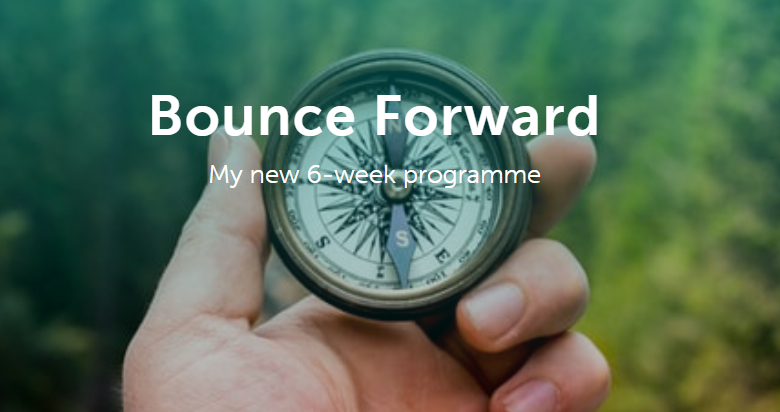The 16th of February is Pancake Day or Shrove Tuesday, which is the day before Lent begins, when people would traditionally use up all their fat and eggs by making pancakes. Lent allows Christians to remember Jesus’s fasting in the desert, and how he avoided temptation. It is a time of giving things up and a test of self-discipline. You could see this as an opportunity to overcome setback or adversity. Rebecca Mander who is one of our fabulous coaches here at Meraki HR, shares her 6 tips with you on how to “bounce forwards” after suffering personal set back or adversity in her guest blog for us this month.
Isn’t it strange how we often feel like happiness is just one step away? That all we need is the pandemic to be over, to have a holiday booked…to get a job…a hug…the list goes on! Whatever it is, we often feel that if we can just achieve that dream, we’ll finally find happiness. The problem is, happiness really doesn’t work that way.
A Yale University study looked at happiness in 12,000 people over the course of 20 years. The results? Happiness on a scale of 1 to 10 did not increase due to materialistic gains, personal achievements or status. Overall, people who are overweight do not instantly become happy when they reach their goal weight, and people with wrinkles don’t see sunshine and rainbows just because they got Botox. It’s also eye-opening to hear how many lottery winners end up unhappy, despite having all the money they could ever need. We are selling ourselves a story.
For starters, do we really understand what happiness is? It’s a difficult one to define, but it’s important that true feelings of happiness and fulfilment are not confused with success, wealth or material gains. Sure, success can contribute to happiness, but only if that success is something that makes us feel fulfilled and valued, doing something we want to be doing.
Happiness is also not a constant state. Throughout our lives there will be experiences that bring unrivalled happiness and joy, just as there will be setbacks that bring us sadness and despair. Learning to navigate these peaks and troughs and developing the ability to bounce back quickly will help us to lead happier, more fulfilled lives.
Happiness in the workplace
As professionals, work is an important facet of our lives. We spend a substantial amount of our time working, and many of our goals and ambitions are tied into our careers. But does hard work lead to happiness?
Happy people generally do better work, are more productive and are likely to stay in the job much longer than someone who gets creeping ZOOM dread week after week. In an organisation I worked with, performance and profitability was high when the CEO and board valued compassion, diversity and high reward for dedication which resulted in a happy team. When the values became profit and production with little to no compassion, happiness in the workplace was reduced, staff turnover increased and profits dropped until the company was no longer a viable operation. Proof if it were needed that happiness yields economic return.
One way that employers can help in these situations is by offering mentoring and coaching to staff during challenging times. By providing that vital support in times of need, employers can help their people to stay productive and well in difficult times and see that they are truly valued by the company. Right now we do need to tip the wellbeing scales in favour of the employee. In a recent survey by Deloitte, there was a positive case for investment in mental health by employers, finding an average return of £5 for every £1 spent, up from the £4 to £1 return identified in 2017.
Six key steps to happiness through setback
Here are my top tips for resilience and each are covered in our Bounce Forward program. The Bounce Forward Program looks at these six areas that are key to your employees feeling more fulfilled and will help them to overcome personal setbacks. By looking within, we can begin to build that sense of contentment and security that fosters a happier, more resilient outlook.
For more information on running the Bounce Forward Programme for your team, get in touch with us for more information about this highly relevant program.
- Know your strengths– celebrate all the areas where you excel, not just in the workplace. To build a way forward, you need to identify what’s in your toolkit.
- Know your path – set goals that matter to you and make them happen. Even the unbelievably great ones are achievable using a simple effective plan and we can help you do that!
- Know your inner voice – silence the imposter in your head. We all have an inner critic, but the messages we send ourselves are often not based on fact.
- Know what’s certain – avoid catastrophising and focus on what you know for sure – not all the terrible situations and possible outcomes your imagination can dream up.
- Knowing your ‘now’ – ground yourself in the here and now, not in ‘what ifs’. Mindfulness can help us to stay calm and maintain perspective in stressful times.
- Make the ultimate choice – Will you be the victim or the victor? Focus on the controlables and discover Charlie’s Star, my own coaching model to support you in making tough decisions, facing challenges and stepping outside of that comfort zone!





















